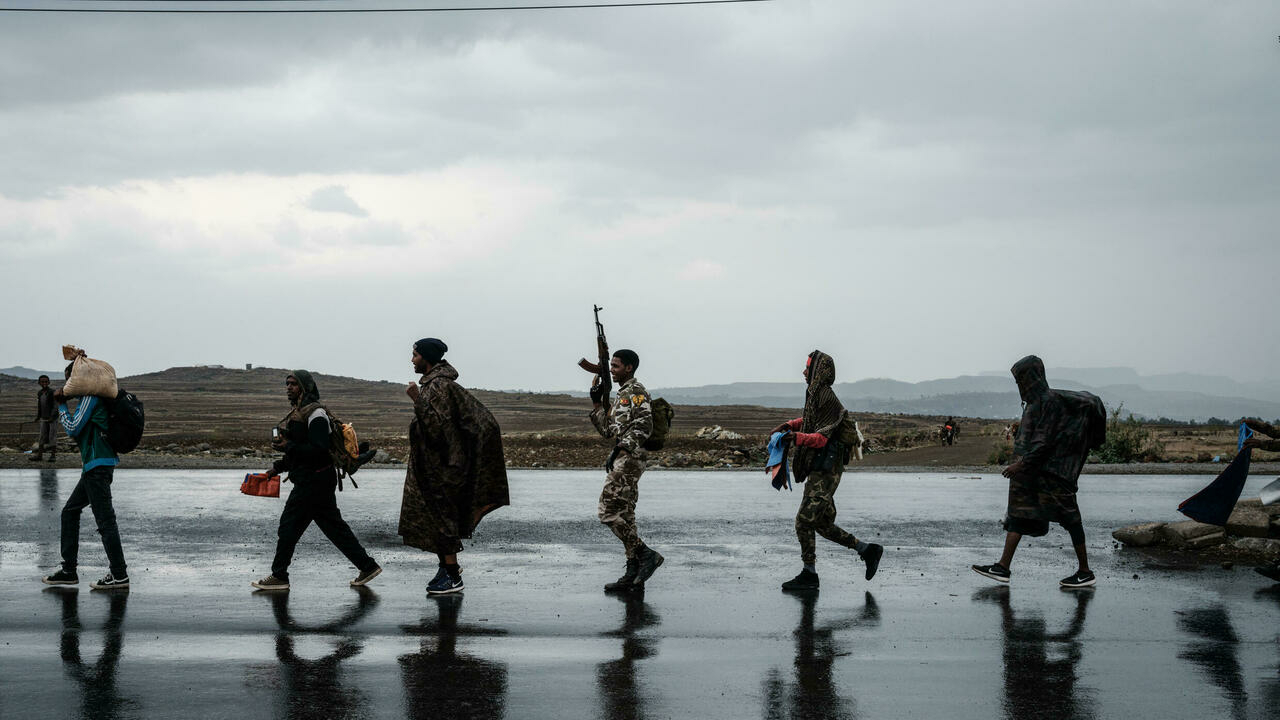
Thousands of people have been killed since the conflict erupted last year between the Ethiopian government and the TPLF
Beirut (AFP) – Rebels from Ethiopia’s Tigray region are drawing on early Islamic history in an Arabic-language propaganda push to rally solidarity among Muslims online for their battle against the government.
Advertising Read more
Thousands of people have been killed since the conflict erupted last year between the government in Addis Ababa and its foes, the rebel Tigrayan People’s Liberation Front (TPLF).
The overwhelmingly Christian Tigrayan people account for less than six percent of Ethiopia’s 110 million people, and the media-savvy TPLF rebels may hope to win over Muslim allies among anti-government forces in the country’s complex multi-ethnic population — as well as generate sympathy abroad.
Amongst Tigray’s five percent Muslim-minority, Tigrinya speakers writing in Arabic have sought to remind people about the role the region played as one of the first Islamic settlements and as a refuge for early Muslims fleeing Mecca.
But while their references may be drawn from the Koran, “the conflict in Ethiopia is not religious but ethnic”, one Tigrayan activist using the alias Mustafa Habashi told AFP in Arabic, who insists his efforts are not connected to TPLF activities.
One Twitter account, “Tigray in Arabic”, has amassed about 40,000 followers in just a few months.
It translates statements by rebel leaders into Arabic and publishes reactions to statements from Addis Ababa.
“Our mastery of Arabic and our Islamic culture has helped us address the Arab and Muslim world to make our cause known,” Habashi said.
Islamic history
After Prime Minister Abiy Ahmed sent federal forces into the Tigray region in November 2020, the number of times “Ethiopia” has appeared in Arabic on social media has risen sharply.
The term received around 70 million likes, clicks, posts and comments on Facebook, according to social media analytics tool CrowdTangle, data that includes all online content about the country.
Tigrayan rebels are drawing on early Islamic history in an Arabic-language propaganda push to rally solidarity among Muslims online Yasuyoshi Chiba AFP/File
For reference, the number of Facebook users in the Arab world stands at about 187 million.
By comparison, between November 2019 and November 2020, amid heightened concerns among Egyptian and Sudanese users over Ethiopia’s upstream Nile mega dam, this figure was less than 40 million.
While Tigray may figure in many people’s consciousness because of the conflict, for much of the Arab world — where Islamic history is on the curriculum in schools — the region’s history is ingrained in the collective imagination.
About 1,400 years ago, companions of the Prophet Mohammed fleeing persecution sought refuge with the Christian king, or Negus, in the city of Axum, now a key town in Tigray.
Tigrayans are using this history to reach out to the estimated 300 million Arabs active on social media.
“How many times has a small troop, by the grace of Allah, defeated a very large troop!” one user writes, quoting the Koran, about David and Goliath to allude to the battle between Tigrayan and Ethiopian forces.
On December 20, the TPLF announced they had withdrawn from the Amhara and Afar regions to their Tigray stronghold.
The account “Tigray in Arabic” references early Islamic general Khaled ibn al-Walid — famed for having emerged victorious in 50 battles because of his tactical skill — to explain the TPLF’s so-called “tactical withdrawal”.
Habashi boasted that the Tigrayan media push meant that Arabic speakers were “becoming more and more interested in what is happening in Ethiopia”.
Media war
Alongside fighting on the ground, both the government in Addis Ababa and the TPLF accuse each other of spreading lies in a bitter media war.
For the TPLF, allied to the rebel Oromo Liberation Army (OLA), the propaganda outreach may also be a way to burnish credentials among the wider 40 million-strong Oromo people, Ethiopia’s largest ethnic group, of whom roughly half are Muslim.
Both the government and the TPLF accuse each other of spreading lies in a bitter media war EDUARDO SOTERAS AFP/File
Internationally, the Tigrayan media campaign may hope to act as a counterbalance to those backing the government, with countries including the United Arab Emirates, Turkey and Iran having reportedly supplied Addis Ababa with drones deployed against the TPLF, according to analysts.
Meanwhile, with relations between Addis Ababa and Sudan and Egypt already frayed over Ethiopia’s construction of its Blue Nile mega dam, the TPLF also may hope to woo backers.
Members of Tigray’s small Muslim minority take every opportunity to make their calls heard to the nearly two billion Muslims around the world.
“In the past, you needed Tigray, and it is because of this that I am a Muslim today,” proclaimed one activist on YouTube. “Now, it is Tigray that needs you.”
© 2021 AFP








